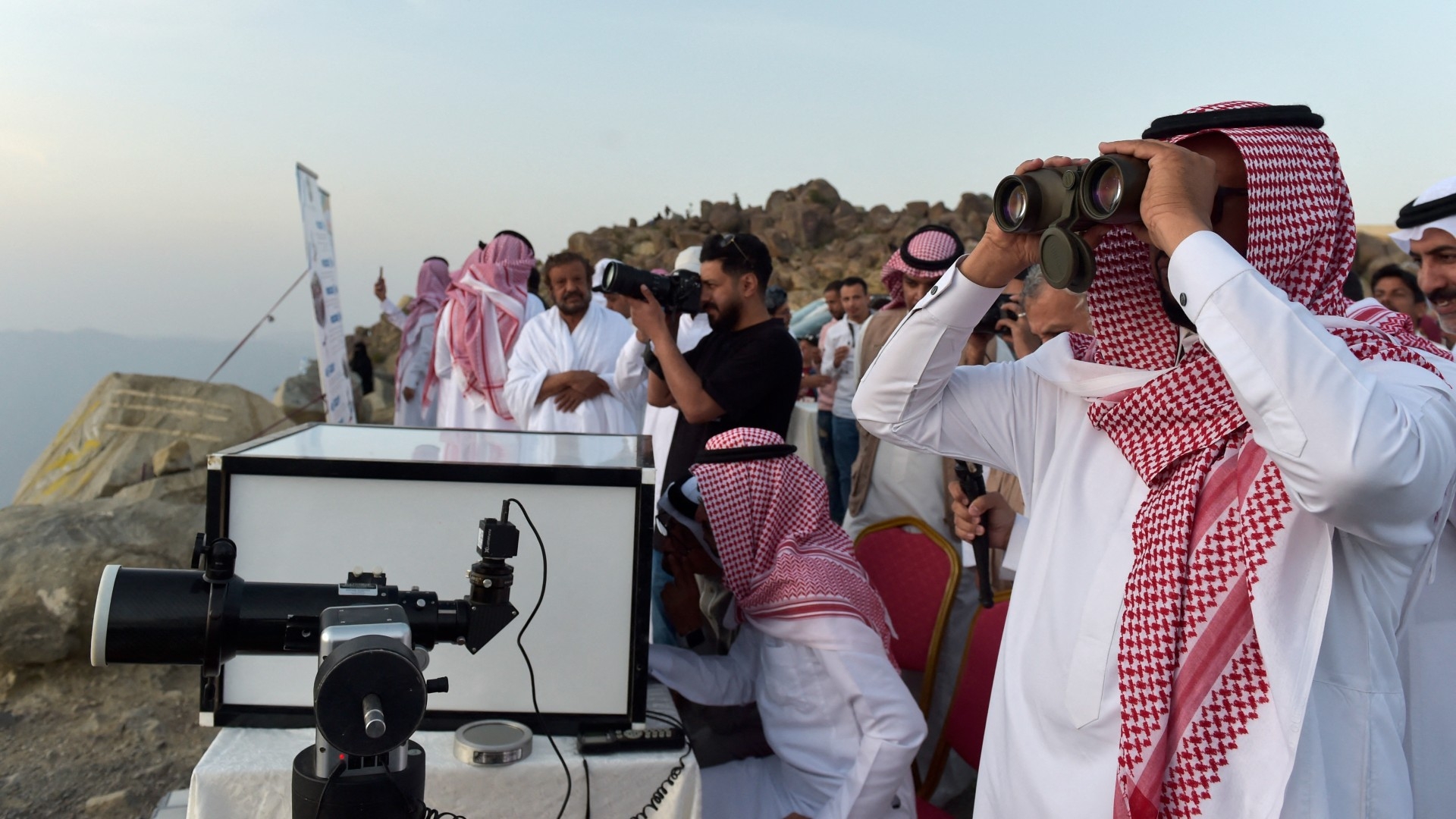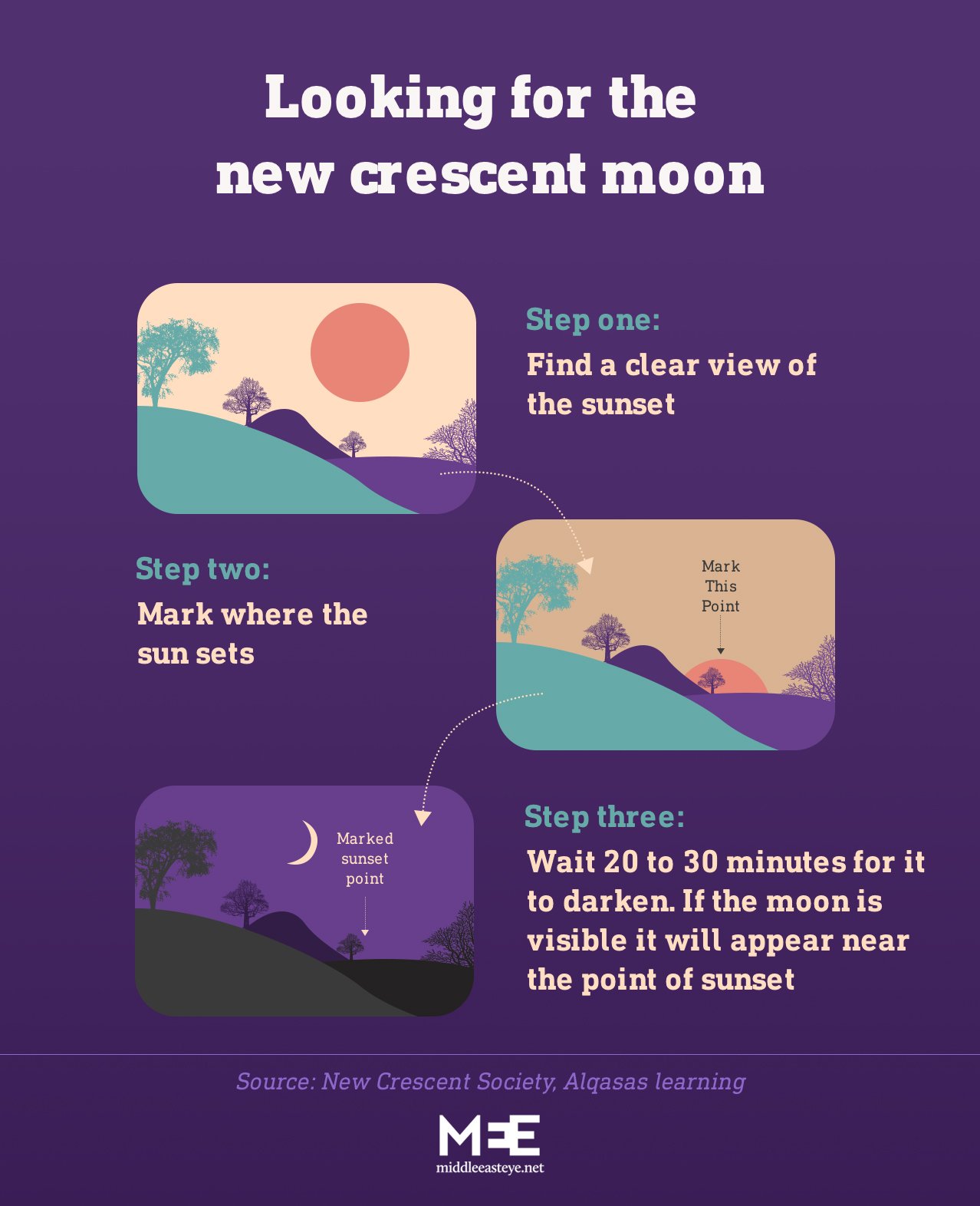Eid moon sighting: Saudi Arabia’s announcement sparks debate

The process of deciding on what day Eid al-Fitr is to be held sparks annual debate and discussion among Muslims, and this year was no exception.
Several countries, such as Saudi Arabia, the United Arab Emirates, and Turkey are celebrating on Friday. But others, including Morocco, Pakistan, and Oman, will hold the festival on Saturday.
Elsewhere, in Libya, Lebanon, and Iraq, Eid has been declared on both days by different authorities.
Muslims follow the lunar calendar, which consists of twelve months lasting between either 29 or 30 days. That discrepancy means that, as with other months, the end of the fasting month of Ramadan depends on the sighting (or lack thereof) of a new moon.
Some countries rely on local moon sighters to spot the new crescent, while others leave it to Saudi Arabia - home to Islam’s holiest sites - to call it.
New MEE newsletter: Jerusalem Dispatch
Sign up to get the latest insights and analysis on Israel-Palestine, alongside Turkey Unpacked and other MEE newsletters
Late on Thursday afternoon, Saudi Arabia’s moon-sighting committee headed outdoors to carry out their search, as documented, at times dramatically, by the ‘The Holy Mosques’ Twitter account.
There were “tense discussions” among astronomers in the central Saudi city of Sudair, with reports of “dissenting” voices and “some disagreements”.
At one point, Kuwaiti astronomer Adel al-Saadoun passionately declared: “It is impossible to see the Crescent this evening...and I challenge anyone who sees it to photograph it as evidence.”
Despite his defiance, Eid was officially declared shortly after, when the moon was sighted in two (out of 13) regions in Saudi Arabia.
Saudi sighting questioned
The debate didn’t end there: many around the world have questioned the Saudi sighting.
Several social media users and commentators referenced crescent moon visibility analysis, which suggested that it should not have been possible for the moon to be sighted in Saudi Arabia.
According to projections published by the UK government earlier this month, the moon should not have been visible (either by the naked eye or with optical aids) across the vast majority of Europe, Africa, Asia, and Australasia on Thursday.
“Not sure I'll ever get tired of commenting on the fact that the Saudis claim they saw the new moon when it's astronomically impossible,” tweeted Middle East analyst Ahmed Gatnash.
Earlier this week, the Abu Dhabi-based International Astronomical Center appeared to agree with those projections.
“Sighting the crescent next Thursday is not possible with the naked eye from anywhere in the Arab and Islamic worlds,” the centre said in the statement.
“Seeing the crescent on Thursday is not possible with a telescope in most Arab countries, with the exception of parts of West Africa starting from Libya, and therefore Saturday will most probably be the first day of Eid Al-Fitr.”
It added that such a sighting would only be possible with an accurate telescope, a professional observer, and exceptional weather - conditions it said were unlikely in the Arab world this year.
But of course, these were just projections, and many Muslim countries did see the new moon.
As well as Saudi Arabia, the moon was also sighted in Kuwait, Qatar, the UAE, and Turkey.
Many nations did not carry out official sightings, but celebrated on Friday on the basis of Saudi Arabia’s announcement.
But in several other countries, the moon was not sighted, and therefore Eid will be on Saturday. These include Morocco, Pakistan, India (outside of Kerala, which follows Saudi Arabia), Australia, Indonesia, and Japan.
Notably, Oman, which shares a border with Saudi Arabia, did not spot the moon and therefore will also celebrate on Saturday.
Echoing Kuwaiti astronomer Saadoun’s challenge, many observers called on Saudi authorities to produce a picture of the moon.
While no official image was provided, Saudi astronomer Mulham al-Hindi did post an image of the faintest outline of a moon that he claimed was taken using a charge-coupled device (CCD) infrared camera.
Several countries have two different dates for Eid this year.
In Iraq, top Shia cleric Ali al-Sistani declared Eid on Saturday, while the Iraqi Islamic Jurisprudence Assembly announced it would be on Friday.
Similarly in Lebanon, the country’s Sunni grand mufti declared Friday, while the Supreme Shia Islamic Council announced it would celebrate on Saturday.
Differences among religious authorities often come down to Islamic jurisprudence, and debates around whether moon sightings should be based on calculations, the naked eye, or sightings with the aid of optical devices.
In Libya, there will also be two different Eids, but in what appears to be a political rather than religious disagreement.
Areas under the Tripoli-based government will mostly celebrate Eid on Saturday, while in the east of the country, run by a rival parliament, the festival began on Friday.
UK mulls cut from Saudi sighting
A debate has raged in the UK about whether it should continue to follow Saudi Arabia’s announcements.
“More Muslims in Britain are now cutting the Saudi umbilical cord. We have dozens of perfectly competent local community groups sighting the moon in the UK every month,” said academic Yahya Birt.
“Why not just go to them? Then families and communities could celebrate Eid 2023 together.”
The New Crescent Society, a group that aims to revive the Islamic tradition of moon sighting in the UK, declared that Eid should be on Saturday, as the moon was not spotted anywhere on the British Isles. But the vast majority of Muslims still celebrated Eid on Friday.
Religious scholars in Saudi Arabia have consistently urged other countries not to follow its lead, but to carry out their own sightings.
A resurfaced viral video, with audio dubbing over footage from the Lord of the Rings franchise, humorously laid out the movement for moon sightings in the UK.
One Islamic school of thought suggests that if unable to carry out moon sightings in one's own country, the faithful should follow that of the nearest Muslim-majority country. In the UK, that would be Morocco, which this year is holding Eid on Saturday.
“If Saudi says Eid is Friday I’m following Morocco [because] I don’t have an Eid outfit,” one social media user joked.
This article is available in French on Middle East Eye French edition.
Middle East Eye delivers independent and unrivalled coverage and analysis of the Middle East, North Africa and beyond. To learn more about republishing this content and the associated fees, please fill out this form. More about MEE can be found here.





